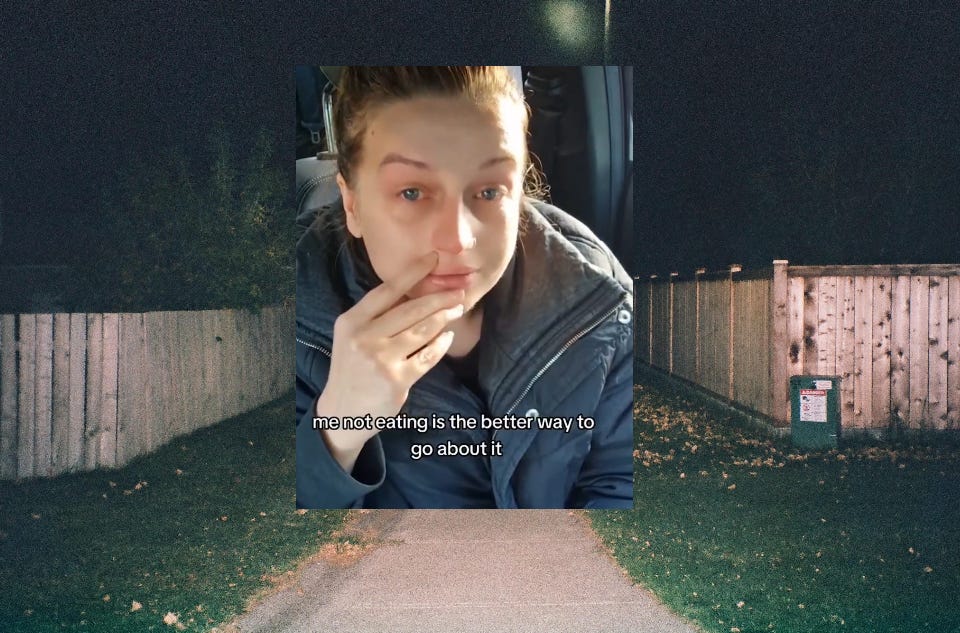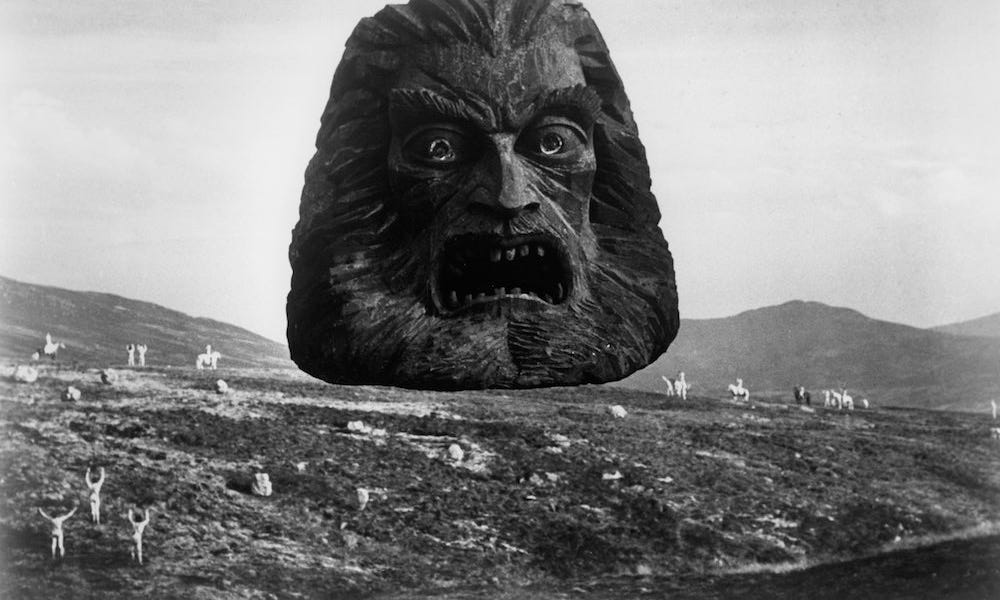Hard Times And The White Wargus

What do women crying for help on TikTok tell us about where we are at the end of 2023?
Heading into the final furlong of a year is always a good time to take a breather and consider what you’ve just lived through and what particular trends or moments encapsulate the previous eleven or twelve months. It is an admittedly subjective endeavour and people’s interpretations will differ, however, the trend that I’ve noticed gradually increasing is that of the distraught white woman speaking to the camera on her phone expressing despair about the economic difficulties she’s facing.
I first began noticing the trend of these videos at least 18 months ago, but throughout 2023 the frequency with which I would see them on social media increased dramatically. I’m sure most people know the format now. A woman in her 20s or 30s sits in her car somewhat disheveled, shouting and crying over the fact that, no matter how many hours she works, no matter how drastically she cuts back her expenses, she cannot keep the budgetary wolf from the door. In Britain we even have terminology now in use to describe this, we call it the ‘‘Cost of Living Crisis’’ or the depressingly blunt ‘‘Heat or Eat’’ phenomenon. The woman will break down her entire income and outgoings as well as detail what bills she will face in the coming weeks or months, the conclusion is, inevitably, that it is untenable.
I’ve seen these videos being made by both men and women, from across the English-speaking world, though the vast majority are filmed by women and increasingly, British women. I find these videos powerful because they’re real. It isn’t a meme or a political talking point but an expression of sheer exhaustion and exasperation. Indeed, it puts a face to the theory and analysis.
In Britain at the end of 2023, there’s a feeling of crisis or emergency, that life has become exponentially more difficult across multiple fronts but it has not been formalized and made ‘‘official’’ by the authorities and so there’s an added layer of confusion and unnerving gloom like in a David Lynch film. There is, to describe it uncouthly, an aura of shitness and squalor permeating life that is difficult to describe and ingest.
The politicians speak and act as if they’re Tony Blair and the year is 1997 which seems to be completely at odds with the grinding crapness of life and sheer scale of national decay. A friend of mine recently told me a story of how his baby daughter was taken ill and the NHS A&E department resembled a train station we had visited in rural Morocco decades ago as young men. Everyone, nurses, porters, and patients, were foreign. He feels lucky that he only has to pay exorbitant amounts of rent to a landlord who has not yet taken the Serco bucks to house immigrants.
The confusion and apathy of the native population are reminiscent of the Eloi in HG Wells’ Time Machine. Members of the group fall into the river and are dragged away to drown and receive not much more than an indifferent blank gaze from their kin.
The country is run by an utterly corrupted technocratic logic that sees people as interchangeable units, except when they qualify for hallowed status under the Equalities Act then identity is bestowed once more but purely negatively. In this way, native Brits have become a weird version of Giorgio Agamben’s ‘‘Homo Sacer’’. The indigenous British live in their own country but without a ritualized identity or sanctified status, in a macabre form of sadism that hallowed status is allotted to the foreigner. This state of exception is what Agamben called ‘‘Bare Life’’. To understand Bare Life we can think of a giant refugee camp situated in somewhere like Turkey. The foreign refugees on Turkish soil are allowed tents, soup, and a blanket but not much more — they have almost no status to speak of.
So much of the confusion and despair in the country is a manifestation of the British inhabiting an ever lower stratum of the social hierarchy but in their own country. The further we move down the economic spectrum the more acute this problem becomes until, eventually, we end up with something like Rotherham and the grooming scandal wherein native white girls were neither protected by the authorities nor safeguarded by family structures. Agamben writes of the ancient Germanic tradition of expelling the ‘‘Wargus’’. A criminal would be expelled from the city and offered no protection. He would live life in a limbo between the city and the forest, belonging truly to neither.
To return to the British women in the TikTok videos, we can see a certain similarity but here in the realm of economic activity and work. Neoliberalism promised that the commodification of everything would lead to material comforts. Mass immigration equated to an endless flow of labour that could be put to work ensuring the lines on the graphs only ever ascended into monetary nirvana. The model of man used was that of a self-interested individual who had sawn through the shackles of ethnic bonds, family ties, or religious concerns. As such, it hardly mattered where the next wave of consumers/producers came from and as a matter of policy, such traits were ruthlessly purged from the native populace.
Thus, as the power structure began to prattle incessantly about ‘‘social cohesion’’ it actively annihilated the pre-existing and emergent cohesion that existed in order to create its own, synthetic rebrand. The British people were told to stare into the sparkling lights as their identity and civilization were systematically broken apart and looted backstage. Nevertheless, the identity and lifestyle adopted was that of the good worker and consumer. Simultaneously though, the toll taken on organic life increased exponentially year on year. Britain is not a country designed for economic hardship, it was once, but the organic bonds and spiritual foundations that were once present to cushion a hard material landing were turned into trashy retail parks and Lidls.
The growing sense of existential dread as inflation rises and the housing stock is engineered into an unachievable dream signals a welching on the promise of the economic model and its eventual demise. As Northern Variant on Twitter put it:
That's what happens when society is atomized and fragmented, and the basic deal is a bum deal. You work all hours to be able to afford to keep living in a house you'll never own, and be evicted from if you ever get sick, or you simply scale down your ambitions and live hand to mouth.
Politicians have long used immigration as a sticking plaster to mask anaemic growth while neglecting the fundamentals of a functioning society. It's quantitative easing but with people. It's dangerous, destructive and immoral. We're becoming a low-trust society that will ultimately deteriorate to Greek levels of corruption and crime in public life, where nothing gets done without a bribe, and politics is sectarian and tribal.
Using the Third World masses as quantitative easing with people is now merely compounding the problems created by the economic model in a desperate attempt to prevent the line from dropping further.
For the woman crying into her iPhone in her car after another 12-hour shift that will be snatched straight out of her bank account, there must be a profound sense of impending doom because no life exists outside of the commodified one and a great gaping, existential chasm now opens up below her. No sustenance is to be found in tradition but now the Great God of materialism is proven to be nothing more than the giant floating stone head of Zardoz.

Even the rhetoric used by the women in these videos signals abandonment by a deity or a sundering of a faith system ‘‘I did everything I could’’ or ‘‘What am I supposed to do now?’’ and ‘‘I just can’t go on like this’’.
I feel for them.
I’ve seen young women working night shifts in packing warehouses reduced to tears because standing in safety boots for ten hours had caused them severe pain. Others broke down because they ‘‘Just didn’t want to be there’’ but they never had a choice because the economic model had to be serviced like an abusive pimp.
Always the implicit promise was that, if you abided by the wishes of the economy, then you would in some way ‘‘advance’’ materially. Sure, the only shops you see these days on the High Streets are vape shops and money-laundering Turkish Hairdressers, but somewhere out there on the periphery, there’s a cardboard shitbox new-build with a convoluted 40-year mortgage scheme attached to it that could be yours if you aren’t fired to make way for more ‘‘vibrancy’’ in the workplace.
In Britain, at the end of 2023, it has been normalized that foreign men will be housed in luxurious hotels while our people wrap themselves up in soggy cardboard outside against its walls. Once more, the sanctified within the walls of the city and the native wargus outside. However, this isn’t entirely a council of despair.
For years people have held to the view that no change was possible while people were as comfortable as they had become accustomed to under neoliberalism. We are a soft, decadent society that can no longer afford to be, and the phenomenon of the female TikTok rant is disillusionment manifesting. Not just with an economic system, but the moral codes and ideological diktats that swim alongside it. Suddenly, feminism seems like a big joke. Politically it’s already being mothballed to make way for transsexualism, culturally it lingers on pointlessly. The promise, of course, was that women could enter the workplace and, as always, advance materially. But if advancing materially now just means not drowning in debt and keeping the heating on then why bother?
Anyone who has watched an advert or seen any corporate ESG-inspired sloganeering could quite rightly ask themselves: where the hell did white men go? The answer is of course that we were long ago cast out of the cultural citadel and reduced to the wargus stalking the wastelands. Witness now as the citadel gates open once more as our womenfolk are cast outside to join us.
Each year I try to have a narrative through-line or arc that underpins my content. This year was the year of ‘‘The Great Turning Away’’.
Perhaps next year will be ‘‘Into The Forest’’…